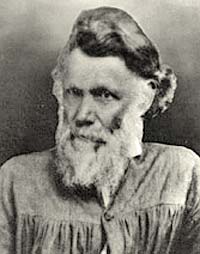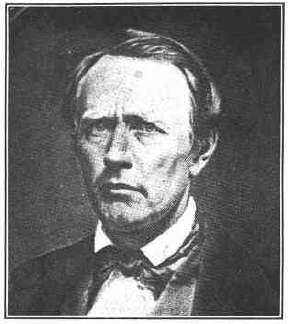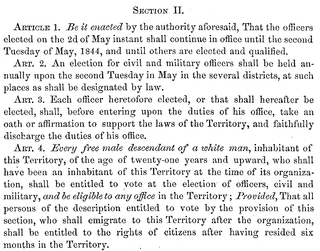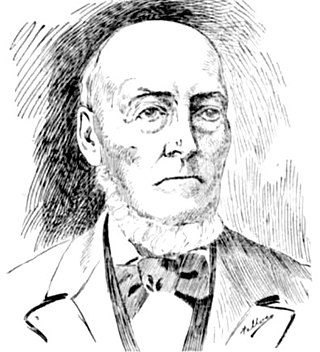Related Research Articles

Joseph Goff Gale was an American pioneer, trapper, entrepreneur, and politician who contributed to the early settlement of the Oregon Country. There he assisted in the construction of the first sailing vessel built in what would become the state of Oregon, sailed the ship to California to trade for cattle, and later served as one of three co-executives ("governors") in the Provisional Government of Oregon. Originally a sailor, he also spent time in the fur trade, as a farmer, and a gold miner in the California Gold Rush.

The Champoeg Meetings were the first attempts at formal governance by European-American and French Canadian pioneers in the Oregon Country on the Pacific Northwest coast of North America. Between 1841 and 1843, a series of public councils was held at Champoeg, a settlement on the French Prairie of the Willamette River valley in present-day Marion County, Oregon, and at surrounding settlements. The meetings were organized by newly arrived settlers as well as Protestant missionaries from the Methodist Mission and Catholic Jesuit priests from Canada.
Robert Moore was an American politician and pioneer in the Oregon Country. A Pennsylvania native and veteran of the War of 1812, he also participated in the early movements to form a government in Oregon Country and founded Linn City, Oregon. Before traveling to Oregon in 1840 he had served in the Missouri General Assembly.
William J. Bailey was a British-born physician who migrated to the United States, where he became a pioneer and politician in the Oregon Country, particularly the Willamette Valley. Bailey participated in the Champoeg Meetings that led to the creation of a provisional government in Oregon. He was selected as a member of that government, first on the executive committee and later in the Provisional Legislature of Oregon.

The Provisional Government of Oregon was a popularly elected settler government created in the Oregon Country, in the Pacific Northwest region of North America. Its formation had been advanced at the Champoeg Meetings since February 17, 1841, and it existed from May 2, 1843 until March 3, 1849, and provided a legal system and a common defense amongst the mostly American pioneers settling an area then inhabited by the many Indigenous Nations. Much of the region's geography and many of the Natives were not known by people of European descent until several exploratory tours were authorized at the turn of the 18th and 19th centuries. The Organic Laws of Oregon were adopted in 1843 with its preamble stating that settlers only agreed to the laws "until such time as the United States of America extend their jurisdiction over us". According to a message from the government in 1844, the rising settler population was beginning to flourish among the "savages", who were "the chief obstruction to the entrance of civilization" in a land of "ignorance and idolatry".
Webley John Hauxhurst Jr. was a pioneer in Oregon Country. He helped build the first grist mill in Oregon, participated in the Willamette Cattle Company, and was a participant at the Champoeg meeting where he voted for the creation of a provisional government.

William Holden Willson was a pioneer of the U.S. state of Oregon and the founder of its capital city, Salem. A native of New Hampshire, he immigrated to the Oregon Country in 1837 to work at the Methodist Mission, and there would participate in the Champoeg Meetings. Willson served as the first treasurer of the Provisional Government of Oregon.

The Provisional Legislature of Oregon was the single-chamber legislative body of the Provisional Government of Oregon. It served the Oregon Country of the Pacific Northwest of North America from 1843 until early 1849 at a time when no country had sovereignty over the region. This democratically elected legislature became the Oregon Territorial Legislature when the territorial authorities arrived after the creation of the Oregon Territory by the United States in 1848. The body was first termed the Legislative Committee and later renamed the House of Representatives. Over the course of its six-year history the legislature passed laws, including taxation and liquor regulation, and created an army to deal with conflicts with Native Americans.

The Organic Laws of Oregon were two sets of legislation passed in the 1840s by a group of primarily American settlers based in the Willamette Valley. These laws were drafted after the Champoeg Meetings and created the structure of a government in the Oregon Country. At the last Champoeg Meeting in May 1843, the majority voted to create what became the Provisional Government of Oregon. Laws were drafted by the committee and accepted by a popular vote in July. These laws were reformed by a second version in 1845.

John Smith Griffin (1807–1899) was an American missionary in Oregon Country who participated at the Champoeg Meetings that created the Provisional Government of Oregon in 1843. In Oregon he served as a tutor at Fort Vancouver and later organized a church on the Tualatin Plains in the Tualatin Valley.

Robert "Doc" Newell was an American politician and fur trapper in the Oregon Country. He was a frontier doctor in what would become the U.S. state of Oregon. A native of Ohio, he served in the Provisional Government of Oregon and later was a member of the Oregon State Legislature. The Newell House Museum, his reconstructed former home on the French Prairie in Champoeg, is listed on the National Register of Historic Places.

Reverend Josiah Lamberson Parrish was an American missionary in the Pacific Northwest and trustee of the Oregon Institute at its founding. A native of New York, he also participated in the Champoeg Meetings that led to the formation of the Provisional Government of Oregon in 1843. Parrish was married three times and was the first breeder of pure-bred sheep in Oregon.
George Wood "Squire" Ebbert was a mountain man and early settler in the Oregon Country. Born in Kentucky, he settled on the Tualatin Plains in what became Oregon and participated in the Champoeg Meetings that created a government prior to the formation of the Oregon Territory. During the Cayuse War he traveled with Joseph Meek across the Rocky Mountains to ask Congress for assistance with the war.
Dr. Elijah White (1806–1879) was a missionary and agent for the United States government in Oregon Country during the mid-19th century. A trained physician from New York State, he first traveled to Oregon as part of the Methodist Mission in the Willamette Valley. He returned to the region after a falling-out with mission leader Jason Lee as the leader of one of the first large wagon trains across the Oregon Trail and as a sub-Indian agent of the federal government. In Oregon he used his authority to regulate affairs between the Natives and settlers, and even between settlers. White left the region in 1845 as a messenger for the Provisional Government of Oregon to the United States Congress, returning in 1850 before leaving again for California in the early 1860s.
Albert E. "A.E." Wilson was an American pioneer and merchant in Oregon Country. Raised in the United States, he moved to what would become the U.S. state of Oregon where he operated stores, was involved in politics, and was elected as the first judge of the Provisional Government of Oregon.

Francis Fletcher was a prominent pioneer of the U.S. state of Oregon and a member of the Peoria Party.

Harvey L. Clarke was an educator, missionary, and settler first on the North Tualatin Plains which would become Glencoe, Oregon, and then on the West Tualatin Plains that would become Forest Grove, Oregon. A native of Vermont, he moved to the Oregon Country in 1840 where he participated at the Champoeg Meetings, May 2, 1843, and helped to found Tualatin Academy that later became Pacific University. Clarke also worked for the Methodist Mission and was a chaplain for the Provisional Legislature of Oregon in 1845.
James A. O’Neil was an American businessman and politician in the Oregon Country and later Oregon Territory. A New York native, he took part in the Champoeg Meetings and helped form the Provisional Government of Oregon. Prior to the formation of a government he participated in the Willamette Cattle Company, and later served as a judge in the Provisional Government.
Michel Laframboise was a French Canadian fur trader in the Oregon Country who settled on the French Prairie in the modern U.S. state of Oregon. A native of Varennes, Quebec, he worked for the Pacific Fur Company, the North West Company, and the Hudson’s Bay Company before he later became a farmer and ferry operator. In 1843 he participated in the Champoeg Meetings. Though he voted against the measure to form a provisional government, the measure passed and led to the creation of the Provisional Government of Oregon.
Felix Hathaway was an American carpenter and pioneer in what became the state of Oregon. A native of New England, he settled in the Oregon Country where he helped construct the first American-built ship in what became the state of Oregon. His home was used for the first meeting of the Provisional Legislature of Oregon in 1844.
References
- ↑ "Short Biography of Joseph Holman". The Quarterly of the Oregon Historical Society. Oregon Historical Society. 4 (4): 392–394. December 1903. JSTOR 20609592 . Retrieved September 16, 2022.
- ↑ Lewis, David. "Robert Shortess (1797-1878)". oregonencyclopedia.org. Oregon Historical Society. Retrieved September 16, 2022.
- Bancroft, Hubert Howe (1886). History of Oregon, 2 volumes. San Francisco: The History Company.
- Bancroft, Hubert Howe (1884). History of the Pacific States of North America, 2 volumes. San Francisco: A.L. Bancroft & Company.
- Clarke, Samuel A. (1905). Pioneer Days of Oregon History, 2 volumes. Portland, Oregon: J.K. Gill Company.
- Corning, Howard M., editor. Dictionary of Oregon History. Portland, Oregon: Binfords & Mort, 1956.
- Dobbs, Caroline C. Men of Champoeg. 1932. Reprint Cottage Grove, Oregon: Emerald Valley Craftsmen, 1975.
- Evans, Elwood. History of the Pacific Northwest: Oregon and Washington, 2 volumes. Portland, Oregon: North Pacific History Company, 1889.
- Farnham, Thomas J. Travels in the Great Western Prairies. New York: Greely & McElrath, 1843. Copyright 1977 by Rodney R. McCallum, Monroe, Oregon.
- Fletcher, Randol B. "Oregon or the Grave" Columbia Magazine, Washington Historical Society, Tacoma, WA. Winter 2006.
- Holman, Joseph. "Short Biography of Joseph Holman". Quarterly of the Oregon Historical Society, volume 4, pages 392-394, 1903.
- Mockford, Stuart B., editor. "Jason Lee's Peoria Speech." Oregon Historical Quarterly, volume 59, pages 19–26, 1958.
- Scott, Harvey W. History of the Oregon Country (The account of Amos Cook), 6 volumes compiled by Leslie M. Scott. Cambridge, Massachusetts: Riverside Press, 1924.
- Scott, Jessie. "Discord Among the Pioneers". Oregon Journal, page 36. Portland, Oregon: June 18, 1939.
- Shortess, Robert. "First Emigrants to Oregon". Transactions of the Oregon Pioneer Association, pages 92–107. Portland, Oregon: George H. Himes & Company, 1897. Shortess's narrative is the best first person account of the Peoria Party – RBF.
- Smith, Sidney. Diary of Sidney Smith, 1839. Unpublished manuscript in the Oregon Collection of the University of Oregon library.